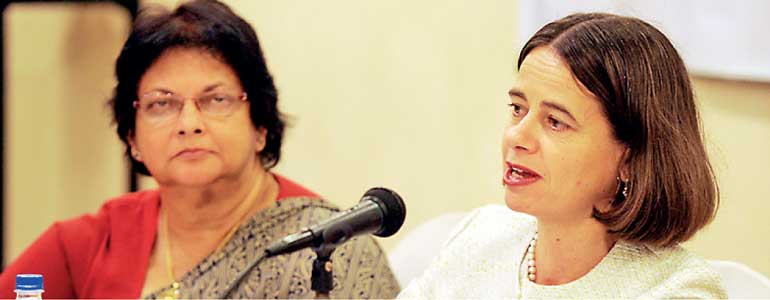Wednesday Feb 25, 2026
Wednesday Feb 25, 2026
Wednesday, 2 December 2015 00:00 - - {{hitsCtrl.values.hits}}

Australian High Commissioner Robyn Mudie answering a question at the inaugural ‘power lunch’ event organised by the Women’s Chamber of Industry and Commerce in Colombo

Australian High Commissioner Robyn Mudie and Women’s Chamber of Industry and Commerce Chairperson Rifa Musthapha, with the members of WCIC at their inaugural ‘power lunch’ event in Colombo
The Australian High Commissioner Robyn Mudie was the Chief Guest at the inaugural ‘power lunch’ held for members of the Women’s Chamber of Industry and Commerce (WCIC) on 26 November.
The WCIC aims to incorporate women entrepreneurs into the main stream of business activity in the country. The power lunch was the first of a series of meetings with business leaders, policy makers and the diplomatic community which the Chamber plans to run on a regular basis.
Mudie addressed chamber members on ‘Why the inclusion of women in the economy is smart economics’. “The Indo-Pacific region loses up to 47 billion per year as a result of women’s limited access to economic opportunities,” she said. She urged WCIC members to encourage women’s participation in the labour force, to support women’s skills development and build their capacity to take on leadership roles. “There is a great opportunity for business to demonstrate leadership by ensuring that women are part of Sri Lanka’s economic future.”
Mudie said Australia has used leadership opportunities on the global stage to advocate for the empowerment of women. “As Chair of the Indian Ocean Rim Association (IORA) from 2013-15 we championed this cause. As a result women’s empowerment was agreed to as a cross cutting issue across the work of IORA,” said Mudie.
The High Commissioner also noted that Australia has been supporting the economic empowerment of women in Sri Lankan for many years in partnership with the government, development partners and the private sector. “One such partnership between a large fishing cooperative in Kilinochchi, a seafood export company and two government authorities has resulted in over 1,000 fishing families selling their crab catch through the cooperative at market rates. In just one year, this has led to the processing of 180,000 kg of crab, creating 15,000 working days of employment for local women.” she said.
Mudie said that such partnerships showed that “business leaders can be agents for change, and help implement commitments to empower women in Sri Lanka and around the world. This is simply smart economics.”